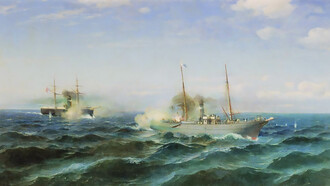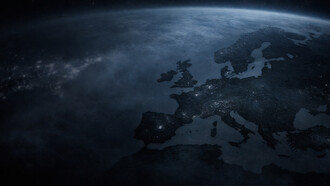In a previous posting, it was argued that the war of aggression initiated by Vladimir Putin against Ukraine on 14 February 2022 has been conducted under false premises: the demilitarization and denazification of Ukraine and the protection of Russian-speaking populations from genocide in the Donbas region.
Putin’s justification for its invasion lacks both factual and legal grounding in international law, particularly the claim that Ukraine was committing genocide. The rationale for the invasion is inconsistent with the legal framework of the 1948 Genocide Convention. This convention obliges states to prevent and punish the universal crime of genocide, but there has never been any credible evidence that Ukraine was engaging in genocidal acts. Moscow's claims and the misuse and distortion of the purpose of the Genocide Convention have been seen as part of its propaganda effort rather than a legitimate legal basis.
The use of force assumptions was equally false. Putin wanted the swift capture of Kyiv and the decapitation of the government, the collapse of the Ukrainian limited defenses within days, and the destruction of any resistance against Russian retention and control of Ukrainian territories. He expected to achieve a quick and decisive victory by relying on superiority of mass against, good strategic planning, and Russia’s ability to project effective military power.
However, the war has since shown that Russia cannot—and perhaps never will—secure a quick and decisive victory against Ukraine. From the onset, Russia's external vulnerabilities became apparent: poor-quality forces, inadequate planning, ineffective command and control, and insufficient training for both ground and air units. Communication failures, faulty intelligence, poor operational security, and unsustainable losses in equipment and personnel further highlighted its weaknesses. Overall, Russia’s capacity to project effective military power had been overestimated.
In reality, nearly three years later, not much has changed. Contrary to Putin’s expectations, President Volodymyr Zelensky’s government, backed by the majority of Ukrainians, remains in power and continues to fight a war supported by the West. Ukraine has exceeded all expectations, and even Putin’s nuclear threats have lost credibility as they have failed to halt the war.
False premises lead to detrimental results. Putin underestimated NATO's largely unified response to the conflict and the continued military support provided to Ukraine. He did not foresee the reassessment of the security postures of neighboring states in light of the invasion and distrust for Russia. Finland and Sweden have joined NATO. The geographic locations of these two new members bring NATO to the Russian borders whilst enhancing the Western military alliance's strategic positioning in the Baltic Sea and Arctic regions. Both countries, with modern, capable armed forces, have injected overall military strength, unity, and deterrence capability into the alliance against potential threats, particularly from Russia.
The expansion of the alliance is a nightmare for Putin in terms of national security and the projection of military might. It is all Putin’s own goal! The shift in the regional security landscape caused by the war means that Russia has to continuously reassess its military and strategic posture in Northern Europe. A weakened Russia has to redeploy to and maintain additional forces and weapons systems in the region, and yet, these resources are already concentrated in the armed conflict with Ukraine.
In addition, the horrors of war are costly. Russia has lost more than 450,000 soldiers and military equipment at a staggering rate since the war began. As Russian losses continue to mount, a key question is: for how long can Moscow sustain these attritional losses?
These losses should not come as a surprise. The Russian military has long suffered from inexperienced officers and overly rigid and complex command structures, amongst other failures. The reorganization of its army carried out earlier this year is unlikely to succeed due to endemic problems with political leadership and civilian control of the military.
Similarly, Ukraine has suffered enormous costs and could not sustain the war without Western support. Ukrainian positions in the Donbas region remain under threat. They have struggled to stop the slow Russian advance. However, the Ukrainian vulnerabilities are not the issue at hand here.
The central matter is that Putin is in a quagmire. Russia has underestimated the resilience, the determination, and the strategic planning and tactics of the Ukrainian army military operations. These qualities have allowed Ukrainians to excel in the conflict. Moreover, much like at the war's outset, recent Ukrainian advances into Russian territory have revealed critical vulnerabilities in Russia's military and security architecture.
Ukraine’s bold and audacious latest incursion into the Kursk region could even alter the war's outcome, reigniting the belief, among some experts, that Ukraine can defeat Russia.
Incursion in Kursk
Ukrainian deep incursions into Russian territory started in 2023. For months, Ukraine has intensified a destructive drone campaign against Russia, targeting oil refineries, airfields, and even launching strikes on Moscow. The drone attacks have caused damage to infrastructure and homes, leading to the evacuation of thousands of residents.
These early cross-border incursions highlight strained defenses, weaknesses in military infrastructure, and declining Russian security capabilities. Russia has struggled to fend off these operations, putting Putin under increasing pressure to end the conflict in Russia's vulnerable backyard and protect Russian citizens. This new shift in the war's dynamics challenges the image of invulnerability that Putin has frequently projected both domestically and internationally.
The recent incursion in Kursk is a significant blow to Vladimir Putin! Russia is finally having a taste of its own medicine! For the first time since 1944, Russia loses sovereign control over a portion of its own territory, and it is under the occupation of a weaker military power. His efforts to reclaim the Ukrainian territories, which he believes rightfully and historically belong to Russia, have instead led to territorial losses. He may now be starting to realize that Russia is not the superpower he once believed it to be.
On August 6, Ukraine, fully exercising its right to self-defence enshrined in Article 51 of the UN Charter, launched an incursion into Kursk. Ukrainian forces successfully disrupted Russian supply lines by targeting and destroying key strategic infrastructure, including bridges critical to Russian military operations. By August 25—just two weeks later—Ukraine had occupied approximately 1,175 square kilometres of Russian territory, matching the amount of land Russian forces had seized from Ukraine between October 2023 and July 2024, according to a recent assessment by the Institute for the Study of War.
The incursion is a prime example of security, military, and operational strategy. Ukrainian forces seized the initiative with a bold and well-executed operation in the Kursk region. As an expert from the International Institute for Strategic Studies aptly described the ingenious move, Ukraine achieved complete strategic and operational surprise through concealment, deception, and exploiting Russian complacency. Even pro-Kremlin newspapers acknowledged the incursion as a “strong move with unpleasant consequences for the [Russian] side,” admitting that “the enemy is acting skilfully and boldly.”
Ukraine has indeed outmaneuvered Russia. A combination of “surprise, maneuver, and tactical cunning” has exposed Russia’s intelligence failures and poor border security.
The cross-border raid has underlined the lack of synchronization within Russia’s armed forces, along with weak surveillance and reconnaissance capabilities that limit the detection and response to external threats. The ability of Ukrainian forces to penetrate deep into Russian territory, coupled with the substantial damage from bombings, supports this thesis.
There are also growing doubts about resource allocation and defensive planning. The incursion suggests that Russian forces might be overstretched, despite having superior numbers, due to their focus on the Ukrainian front and leaving other regions more exposed. If Russia's ability to defend its own territory and citizens is in doubt, then its capacity to sustain offensive operations in Ukraine also comes into question. Kursk residents have called on Putin for help after the Ukrainian incursion.
These operational and strategic defensive shortcomings highlight the risks Russia faces. Despite these critical vulnerabilities, Russia has failed to strengthen its defenses against Ukrainian incursions. Once reinforced by a formidable military, its security appears to have significantly deteriorated since the invasion began. Russia’s claims of military superiority have been challenged, and its fault lines may erode confidence both domestically and among its allies.
Overcoming these deficiencies would be an uphill battle because Russia, with confused and ineffective command structures and a dysfunctional military leadership, continues to complicate and bureaucratize the military response to the incursion in Kursk. In fact, the Russian reaction to the incursion has been described as “slow and chaotic.” There is a “mix of border guards, national guards, Federal Security Service, regular army, and local authorities, and it’s not clear who’s responsible.”
Ukraine has not won the war yet, but success in Kursk is greater than mere territorial gains. It is reasonable to conclude that Russia's territorial gains have been driven more by sheer numbers than tactical skill, proving that on the battlefield, quality outweighs quantity.
Ukraine’s superior maneuverability shows that its military strategy extends beyond long-range strikes on critical infrastructure in occupied territories like Crimea and Luhansk. The strategy integrates these attacks with coordinated ground operations, forming a hybrid approach that significantly enhances the overall effectiveness of their military efforts.
The incursion could potentially alter the outcome of the war by changing the dynamics on the battlefield. It is certainly “offsetting Russia’s overwhelming economic and numerical advantage,” shifting international perceptions, and possibly influencing foreign military support for Ukraine while affecting Russian morale.
However, the conflict is still evolving, and Ukraine now faces a different set of challenges, particularly the difficulty of holding onto the captured territory. Russia's military responses—intensification of its attacks, use of local proxies, and alliances with countries like Iran and North Korea—could complicate the Ukraine's ability to maintain control over these areas, at least until a ceasefire or a peace agreement -if ever- is eventually reached. In fact, Iran is supplying Russia with short-range ballistic missiles to use against Ukraine and, with this, intensifying the geopolitical tensions surrounding the conflict.
North Korea has deployed a contingent of approximately 8,000 troops to Russia, according to Western intelligence officials. This number is expected to grow as the troops complete training and move toward the front lines. The Kremlin likely aims to use North Korean forces to strengthen its ongoing offensive and ease the strain on Russia’s own force generation capacity.
A Russian counteroffensive to recover parts of Kursk is also underway even though this action has not gained strength. The ultimate success in holding the Ukrainian territorial gains will depend on sustained military momentum, asymmetry of firepower and manpower forces between the belligerents, diplomatic negotiations, and the broader geopolitical context.
Other complications besides the coming winter might put additional strain on Ukraine's armed forces. The operation has not addressed the existing material imbalance in the war, with Russia still maintaining a lead in manpower, equipment, and ammunition. This advantage has neither been decisive nor resulted in any significant operational breakthroughs in Kursk for the Russians, but it is still problematic. Holding positions in Kursk or expanding the territorial gains would pose substantial logistical difficulties, as the extended supply lines would be exposed to potential attacks. Furthermore, it remains unclear how Ukraine's leadership plans to translate the tactical success of the incursion into broader strategic or political gains.
Essentially, Ukraine's ultimate success in retaining its territorial gains will depend on sustained military momentum, asymmetry of firepower and manpower forces between the belligerents, diplomatic negotiations, and the broader geopolitical context.
Aims of Ukraine
Despite these challenges, Ukraine's strategic positioning has shifted for now, and the incursion may have several possible objectives.
First, given the preceding arguments, the incursion could be interpreted as a warning to Russia's civilian population that the country is now vulnerable to attacks. Ukraine has sent the signal that the war is at home now, because of Moscow's ongoing conflict with Ukraine.
The psychological impact of the war spreading at home could potentially lead to dissent or pressure on Putin’s government, complicating the domestic political dynamics. In other words, a perceived inability to protect Russians and Russian territory could provoke a political backlash and instability against Putin, undermining his domestic stand and reputation. There is already growing significant resentment among Russians, especially as casualties rise and the economy deteriorates. Chaotic mass evacuations have taken place, with people fleeing under heavy shelling, surrounded by destruction, unsure of where to go, and requesting help. Mobile phone networks were down. There have been widespread criticisms of authorities for failing to prevent the surprise attacks.
Second, Kyiv's intention could be to draw Russian forces away from the front lines in eastern Ukraine and to deplete their combat capability. Russian forces are facing pressure from Ukrainian advances in Kursk, prompting them to reassign elements of unidentified units from the Ukrainian frontline to Kursk. This could impact both the timing and effectiveness of future Russian offensive operations in Ukraine.
Thirdly, Ukraine may be demonstrating its capabilities to both the West and beyond in an effort to shift the narrative of the war and encourage continued international support. Therefore, shifting from stalemate to a ‘we could win this war’ narrative would push a reluctant West to provide Ukraine with significant quantities of advanced weaponry and allow their use against strategic targets deeper within Russia. This reluctancy has enabled Russia to use its border regions as secure staging areas for offensives and missile strikes against Ukraine.
The West's concern over a possible Russian escalation has led to caution in supporting any incursions into Russian territory and in permitting Ukraine to use long-range missiles to strike targets beyond Russian borders. However, Ukrainians view this war as an existential fight for survival and are willing to take whatever steps are necessary to secure victory. Many argue that, had Ukraine received the requested weapons at the outset of the invasion rather than incrementally, the war might have already come to an end.
Besides, the success of such incursion, in conjunction with the use of long range missiles, may encourage Ukraine to adopt a more aggressive approach, possibly shifting its focus from defensive to offensive operations. Again, depending on the broader war circumstances, these two factors could lead to an increased pressure on Russian forces along the border.
Fourth, in an effort to outpace the overall Russian military effort and stop them from shelling cities in the region, Ukrainian forces are setting up a buffer zone inside Russian territory. A buffer zone would disadvantage Russian forces, as it would allow Ukrainians to control the key approach routes.
The most effective countermeasure against Russian forces, according to Ukrainian President Volodymyr Zelensky, is the preventative defense of Ukrainian forces in Kursk. He also claimed that Ukrainian forces have cleared the Russian border area near Sumy Oblast of Russian forces.
Fifth, if Ukraine retains its territorial gains, it can use them as a bargaining chip in potential future peace or ceasefire negotiations, potentially securing concessions from Russia. However, at the moment, there is little appetite for negotiations in Ukraine, and even less trust that Russia wouldn’t use a ceasefire to prolong the war. Additionally, there is currently no way to compel Moscow to negotiate. For Putin, the idea of losing the war is unthinkable, and he will only enter into negotiations from a position of strength.
In reality, a war aimed at restoring the balance of power—as realists of international politics would uphold—in response to Ukraine's alignment with the West, and potentially a future member of NATO, is an intolerable scenario for Putin. Therefore, as Tatiana Stanovaya, a senior fellow at the Carnegie Russia Eurasia Center, affirmed, Putin is primarily focused on the collapse and destruction Ukrainian statehood, believing that once that occurs, territorial control will become irrelevant. Consequently, Putin is not interested in a negotiated ceasefire or meaningful peace talks. While Americans and Europeans continue to hope for an elusive diplomatic or negotiated solution, Putin remains focused on pursuing victory at all costs.
However, the collapse of the Ukrainian state is wishful thinking, considering the wrongful and false Russian assumptions driving the war from the start, the catalogue of failures, the broader geopolitical context, and Western backing for Ukraine. In contrast, “If Kyiv accepts a neutral status, a set of political demands and guaranteed unobstructed Russian access to Crimea, Putin might become more flexible on territorial issues.” The precondition for peace talks is that Ukraine gives up territorial claims and gets its forces out from those areas controlled by Russia, a demand that Ukraine firmly rejects.
Considering the implications of the incursion, what will be the next move for Russia?














